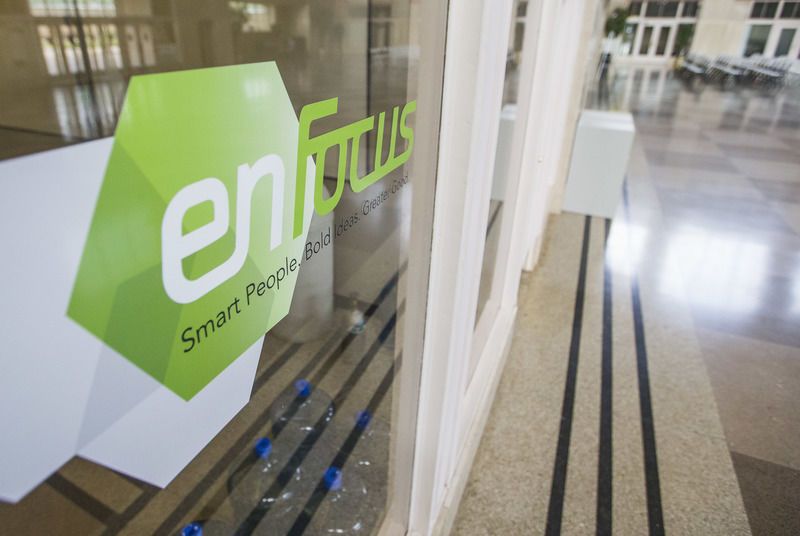A focus on combating brain drain in South Bend area. Fellowships offered to keep college graduates here
By Marshall V. King Tribune Columnist Jun 19, 2017

SOUTH BEND — The value of enFocus Inc. is becoming clear.
A business that could be full of mumbo jumbo is doing research for companies, government and nonprofits. As it does so, it’s keeping college graduates in the region.
“We create opportunities that empower young, recent grads to help the community,” said Lex Dennis, chief strategy officer for the entity that formed in 2012. He was the first enFocus intern in 2013 and then joined it as an employee.
Business leaders in South Bend started it as a nonprofit to attract talent, said Andrew Wiand, executive director. Based on success in St. Joseph County, expansion into Elkhart County is in the works.
EnFocus offers fellowships to recent grads to work on projects that benefit the community. Nearly 80 percent of fellows have stayed in the area, about 90 people altogether.
Wiand can point to fellows who have been plugged into local jobs, including Santiago Garces, chief innovation officer for the city of South Bend. The city hired him after he did a project as an enFocus fellow that used data to show the value of using SUVs on some South Bend Fire Department calls rather than large trucks.
This year, 12 fellows and 151 interns are at work on about 50 ongoing projects, said Wiand. Seventy percent of the time is spent on fee-for-service consulting and the other 30 percent is for incubating ideas or working on side projects. If that sounds familiar, it’s what Google allows its employees to do.
A fellow gets $40,000 and a few additional stipends for technology and health care. Interns ranging from high school students to doctoral candidates aren’t paid. Together, they try to add value by working on projects primarily for cities, counties, schools and hospitals, Dennis said.
The secret sauce is the volunteer mentors, which may be board members or others in the community, who work with fellows and interns on projects. Those experts help guide the work and make it more valuable.
Right now, enFocus is working for the cities of South Bend and Mishawaka, as well as St. Joseph County, to assess the fairness of property value assessments. A team is crunching data from more than 100,000 properties. “It’s an enormous project,” Wiand said.
One project even caused some tension between St. Joseph County commissioners and county assessor Rosemary Mandrici, who had been reluctant to cooperate with enFocus, saying she was too busy to meet weekly with the group, but has since been more accommodating at the urging of commissioners.
Another project for Beacon Health used IBM’s Watson to assess community health needs and how that relates to insurance, emergency room visits and costs.
Yet another project helps people with chronic illness use social media to connect to others also battling it so that they can help each other. The method is helping a group of high-risk mothers avoid the neonatal intensive care unit, Wiand said.
Lilly Endowment believed in enFocus’ approach and gave funding that is part of its $1.4 million annual budget. EnFocus is using people trained in science, technology, engineering and math to attack quality of place and quality of life issues.
“We think that’s our play, that we can bring technologists to a community and change things,” Wiand said. “If you do cool projects, people will come work on them. If (the projects) work, people will hire you.”
For the past six months, a group of people — including Wiand, Dennis and myself — have been at work in the region on a regional economic development plan. Because of this work together, I’ve become a fan of enFocus and the innovative approach to solving problems. Now, a venture called INVANTI is starting up to help aspiring entrepreneurs solve problems. The first cohort could start in September if the group finds funding.
EnFocus and potentially INVANTI are important resources for keeping talent in the region as they engage smart, young professionals by using them as problem solvers.
Getting the program off the ground in Elkhart County means finding more mentors, more people willing to help. The model seems to work. The investment seems to pay.
EnFocus could and should play a larger role in the region. It’s another way to avoid doing business as usual and watching our college graduates all go off to work elsewhere.
Marshall V. King is a freelance writer and journalist who writes this column and other pieces for the South Bend Tribune, but is also working for the Regional Development Authority of North Central Indiana and the Community Foundation of Elkhart County, among others.
